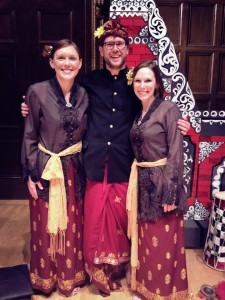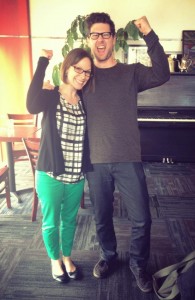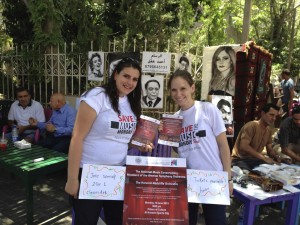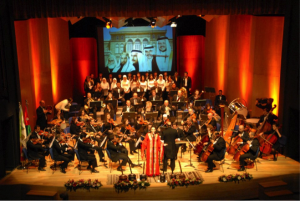This past May, I graduated with another Masters degree (where am I going to put all these things? … just kidding)! My first non-performance degree and a brewing interest of mine, I had an amazing experience exploring ethnomusicology with esteemed professors Ellen Koskoff and Jennifer Kyker.


MA Ethno class of 2014 after performing Austin and I after defending our theses!
in the Gamelan Lila Muni spring concert.
(Rachel Brashier, Austin Richey, me)
The idea for my Masters thesis, Remembering an Orchestra: The life and death of Jordan’s only professional symphony, came as I experienced first-hand the closing of the Amman Symphony Orchestra as a member in 2012. This experience was heart-breaking, complete with the loss of government funding, the subsequent struggle to keep the orchestra alive, and the ASO’s final concert. Yet while I flew home to the U.S. to continue my doctorate degree, the local members of the orchestra remained in Amman, where they began the search for new jobs in a country with no symphony orchestra.
With generous funding from Eastman’s Professional Development Committee and Arts Leadership Program, I returned to Amman for six weeks during the summer of 2013 in order to complete the fieldwork for this thesis. A timely subject, the closing of symphony orchestras is a frequent headline in the arts and culture sections of newspapers worldwide. While most recent literature about orchestra closures focuses on financial difficulties, struggling economies, and budget cuts, far less attention has been paid to the experiences of the musicians affected by these closings. Yet a year after the ASO folded, interviews with former members revealed profound feelings of loss. Some musicians spoke about personal financial struggle, career changes, and a decreased quality social life, while others shared more intangible feelings of loss, alongside memories of happiness and musical fulfillment, as well as hope for the future.
Turning the lens toward the individual lives of musicians, my thesis illustrates both how the ASO established an important social and musical context for over forty musicians, and how, in turn, its closure left a huge void. In June 2013, nearly one year after the closing of the orchestra, I conducted interviews with twenty musicians who formerly performed with the ASO and have continued to live in Amman, Jordan. They spoke about how it felt to play the final concert of the ASO, how their lives and careers have changed since the closing, and what they think the future of classical music in Jordan looks like. My discussions with these musicians raise a number of important questions: How do musicians perceive the importance of cultural institutions like the orchestra? What do musicians and artists think and do when the institutions that support their craft no longer exist? How do they sustain a musical identity after the social context for music making has disappeared? Through their stories, I constructed a narrative of life before, during, and after the orchestra.
As it happened, during my visit back to Jordan many of the former ASO musicians dusted off their instruments and reconvened for the first time since the orchestra’s closing in order to perform with Harvard University’s Harvard-Radcliffe Orchestra on June 10, 2013 at The Palace of Culture in Amman. By volunteering to help with several aspects of this concert, I was able to be with the musicians as their orchestra was brought back to life, if only for one short week. This was a fascinating fieldwork experience, and the concert was a huge success. Yet after this reunion concert, the instruments were returned to their cases for another indefinite period of time, and the reality of life without the ASO sank back in for its musicians.


Want to read more? Send me a message and I will send you my thesis!
